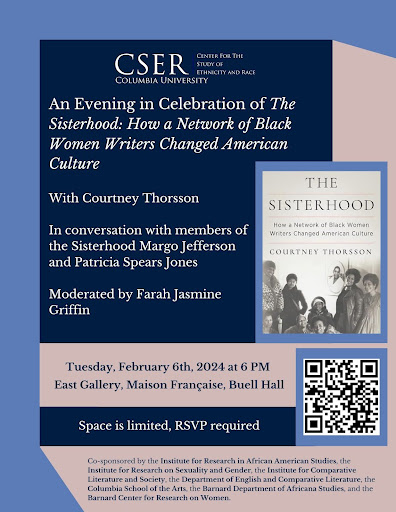Staff Writer Paula Carrión attended an engaging conversation about a group of Black women writers who changed the cultural scene of the 1970s and who call themselves The Sisterhood.
On Tuesday evening, the Columbia Center for the Study of Ethnicity and Race hosted an event in celebration of Courtney Thorsson’s new book, The Sisterhood: How a Network of Black Women Writers Changed American Culture. Thorsson was in conversation with two members of The Sisterhood: Patricia Spears Jones and Margo Jefferson, moderated by Farah Jasmine Griffin.
The Sisterhood is the story of a group of Black women writers who, in the late 1970s, met regularly in poet June Jordan’s Brooklyn apartment, creating a space for Black women to talk about literature and relevant social issues. Other members of the group included Toni Morrison, Alice Walker, Ntozake Shange, Audre Lorde, and Paule Marshall. This book narrates the ways in which The Sisterhood and its members influenced American writing and culture.
Courtney Thorsson (GSAS ’09), who currently works as an associate professor in the English Department at the University of Oregon, started the event by introducing and thanking her interlocutors who were essential in the writing and researching of the book. Thorsson mentioned that much of this research was conducted at Columbia. She also talked about how the picture featured on the book’s cover was her inspiration to take on the project and tell this story. She also explained the structure of the book and her use of close reading of poetry to advance its narrative.

After Thorsson read from the first few pages of The Sisterhood, the conversation officially started with opening remarks from Patricia Spears Jones, 2017 Jackson Poetry Prize winner and recently named New York poet laureate, who talked about The Sisterhood as “people [who] were finding ways of sharing their work.” On this point, Columbia Professor of Practice Margo Jefferson, who has won both a Pulitzer Prize for Criticism and a National Book Critics Circle Award for Autobiography, added that the group’s members “all had these other stories to bring.”
From then on, the dialogue flowed smoothly as these two Sisterhood members reminisced about their time together and discussed the group’s formation as a response to both a “necessity of Black feminism” and a sense of reclamation for female writers who were trailing their way into all kinds of genres. They also described the backlash that many writers of the group faced, especially due to the racism and misogyny that still affect society today, and how The Sisterhood functioned as a supportive network that created space to talk through those issues. Jefferson and Spears Jones admitted that the group sometimes quarreled and disagreed with one another, but that the permeating attitude was that of lightheartedness and friendship. They also shared many recollections that made the audience chuckle, such as Toni Morrison “always sweeping into every room,” and them forgetting that the group had even appointed someone to take minutes of their meetings.
At this point, Columbia Professor of English and Comparative Literature and African American Studies, Farah Jasmine Griffin asked Jefferson and Spears Jones about the “ethos” of The Sisterhood. To this, Spears Jones reflected that, in hindsight, The Sisterhood was all about “collectivity” and “improvisation,” to which Jefferson added: “and it was fun!”
Towards the end, the floor was opened for the audience who raised questions about many topics such as how women gained membership to the group, book recommendations on literary criticism, and how The Sisterhood influenced the lives of its members after the group’s dissolution. This portion of the conversation came to an emotive crown when an audience member—reportedly the granddaughter of one of The Sisterhood’s members—thanked Thorsson and the panelists for sharing so much valuable insight into her grandmother’s life and work.
Creating community and “storming barricades” were the underlying topics throughout the evening. Thorsson’s response expressed that, in these times of social change, she wants younger audiences to take away from her book the meaningfulness of collaborative work, even when we don’t know what the outcomes of it will be.
Flyer via Columbia’s Institute for Comparative Literature and Society
Header image via Author


 0 Comments
0 Comments